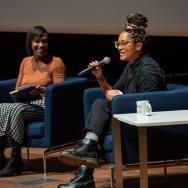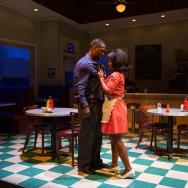Editor’s note: This story is part of Meet a UChicagoan, a regular series focusing on the people who make UChicago a distinct intellectual community. Read about the others here.
Gabrielle Randle-Bent didn’t start off as a theater kid. The Texas native took AP science classes and grew up playing volleyball and basketball. But bad asthma kept her off the court and brought her to the stage.
“There's something magical about watching something come together and knowing how to arrange the pieces,” said Randle-Bent. “Whether it was design or staging or engaging with actors—that felt like a superpower.”
As the Court Theatre’s associate artistic director, no two days look alike. Some days Randle-Bent is deep in rehearsal or lurking in doorways brainstorming programming ideas. Others she’s leading students through Ntozake Shange’s “for colored girls who have considered suicide / when the rainbow is enuf” or running scenarios with the city’s civic leaders.
Randle-Bent joined Court as a full-time staff member last summer, when shuttered theaters were getting back on their feet (the Court did so in spectacular fashion with a 2022 Regional Tony Award). It also was a moment when American regional theater grappled with its identity and history.
“It’s a place where a huge swath of the population can't even imagine themselves going—that was before we were all afraid to be in rooms together,” Randle-Bent said.
Randle-Bent’s relatively new role is part of Court’s commitment to continually reimagine what it means to serve many audiences as a classical theatre. The Court is a center for artistic expression located on Chicago’s South Side. It’s also a vibrant part of the UChicago community, helping to bridge the classroom and the stage, pedagogy and practice.
“What Gabby can bring, because she's kind of a unicorn, is an understanding of how all these worlds operate,” said the Court’s Executive Director Angel Ysaguirre. “So that we're more valuable to the university, we're more valuable to the community, and our artistic work is even stronger. Because all three of them are connected.”
Dramaturg, director, scholar
Randle-Bent began as the inaugural research fellow at Court, co-directing productions including “The Tragedy of Othello” and serving as dramaturg for “Guess Who’s Coming to Dinner.” Many people think of dramaturgs as the scholars in the room—providing designers with historical context or actors with insight into a playwright's intent.
Randle-Bent thinks of the job as more like a great editor—a Toni Morrison to Toni Cade Bambara. Or how an engineer works with an architect. “Anybody can imagine a fanciful building, but part of that work is to craft something beautiful that also withstands gale force winds,” Randle-Bent said.
Most recently, she co-directed the Steppenwolf for Young Adults production of “1919”—an adaptation of Eve Ewing’s poetry collection about Chicago’s 1919 Race Riot. This past fall she made her solo directorial debut at Court with “The Island.”
According to Ysaguirre, making a play set in South Africa feel relevant in Chicago was top of mind for Randle-Bent. “If a classic doesn't have relevance that people can recognize where we are, then it's actually not a classic to us,” Ysaguirre said.
One evening, a young audience member approached Randle-Bent after the post-show discussion. A family member was incarcerated, and the production’s focus on the characters’ humanity while in prison had comforted the audience member in a difficult moment. For Gabby, this is what the work is about.
“I made something that I hoped would nourish somebody and somebody got what they needed from it,” said Randle-Bent. “You can only cook good food. Everything isn’t to everybody's taste, but someone will get fed.”
The focus on humanity also describes her approach to directing. “You could drain people, use people as paint brushes, or you can make a space where folks are conduits and let greatness pass through them,” Randle-Bent said. “And then let them go home and be with their families or their cats.”
In addition to dramaturging and directing, Randle-Bent spends lots of time thinking about how to build a season and develop plays in a way that is not only sustainable, but also a community conversation. “It’s something that we are speaking with people about, rather than speaking to people about. That, to me, is thrilling,” Randle-Bent said.
What makes a classic?
The Court Theatre is classical theater—but exactly what constitutes a classic? The plays of antiquity performed in ancient Greece and Rome are obvious examples. Ideas and stories that having staying power, certainly. As theater has evolved, more and more voices get added to the cannon. But whose voices and by whom?
“Whenever there's a conversation about classic theater, there's always a conversation about who it leaves out,” said Ysaguirre. “And whether or not classic theater, as a notion, can make space for everyone. This is a really integral question to our theatre.”
The Court’s ongoing Oedipus Trilogy tells the mythic tragedy of Sophocles’s Oedipus, a Greek king plagued by an ancient prophecy. Part two, “The Gospel of Colonus,” begins on May 12. The fresh adaptation, blending Black spiritual practice and live gospel music, is co-directed by Mark J.P. Hood and Artistic Director Charles Newell.
“Theater as a living art form means that anything should be fresh, anything can be powerful, anything can be prescient in the moment and exactly what someone needs,” said Randle-Bent, who will direct “Antigone” next season, the trilogy’s final chapter.
“While she has only held this position for a brief time, Gabby has bolstered our programming offerings, shed light into the changing field of dramaturgy and offered nuanced insight in our ongoing discussions about the role of classic theatre,” Newell said. “Court is stronger because of Gabby’s contributions, and I have no doubt that she will accomplish great things; she already has.”



